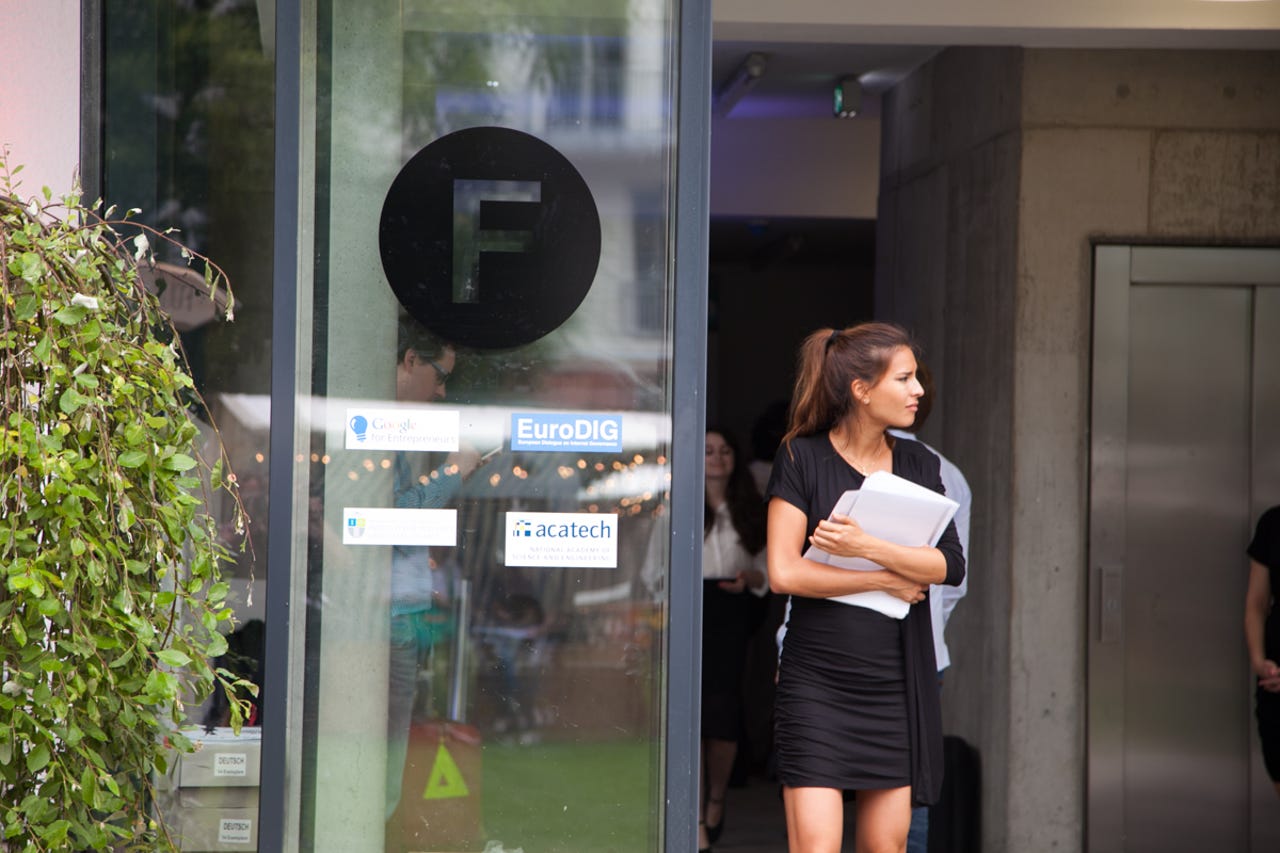Berlin's new Google-backed startup hub finally arrives


After more than two years of hype, Berlin's Google-backed tech hub — known as the Factory — has finally opened. Under ominous thunderclouds during the opening ceremony on Wednesday morning, Berlin's mayor Klaus Wowereit laid out his expectations for the hub.
"Economic growth will not happen without startups," he said, setting the tone for a day filled with growth-building promises.
The building — which sits almost directly on a part of what used to be the Berlin Wall — was once a brewery. Its refurbished 16,000 square metres will now house more than 20 companies — including locally-grown startups such as Soundcloud and 6Wunderkind, as well as the local offices of firms such as Mozilla and Twitter. There’s also an auditorium for talks, plans for a health club and a restaurant, and even accommodation for visiting entrepreneurs.
The Factory was backed by a €1m investment from the Google for Entrepreneurs initiative, which launched in 2012 to partner with organisations that serve entrepreneurs (and which gives Google a direct line for getting its tools and services into startups’ hands.)
In the past few years, the initiative has also supported other workspaces and hubs across Europe, including Le Camping in Paris and the Google Campus in London.
"We want to encourage excellent founders who are dedicated to building original and sustainable businesses, and thus can contribute to the creation of jobs and growth in Germany," Google Germany's managing director Phillip Justus said.
Berlin's startup conveyor belt?
Beyond the talk of jobs and growth, the opening of the Factory might mark the point when Berlin's long-incubating startup scene finally achieves the international legitimacy that many in the city have sought. Throughout the day, "Berlin" was repeatedly uttered in the same breath as other startup hubs such as Silicon Valley, New York City, and London.
It's hard to overstate this long-brewing shift. For all of the city's hype, it's worth noting that until recently, many referred to the scene here as a "copycat machine", due to the pre-eminence of Rocket Internet, whose business model is to essentially analyse successful internet businesses and then duplicate them for localised markets.
Although Rocket Internet is highly successful, its success has come in a way that doesn't fit with the traditional Silicon Valley ethos of what a successful startup should look like. And for some, this has tainted the whole city, putting it at odds with other startup ecosystems.
In a piece on Rocket Internet earlier this year, the New York Times wrote that because of the company’s business model, it "has raised questions over whether Europe’s tech sector, where Rocket is a major player, can ever foster the same level of innovation that has led to a conveyor belt of successful American tech giants like Oracle, Google and Facebook".
But existing alongside Rocket Internet in the Berlin startup ecosystem is Soundcloud, whose business model — build a platform, attract investment, develop ways to sustain the platform — virtually embodies the Silicon Valley startup ethos.
For Soundcloud, moving to the Factory "is a big change overall," according to David Noël, the company’s vice president of community. When Noël joined the company about five years ago, it was based in a converted 19th-century post office. At that time, the startup was in "a small, rickety, tucked-away room with fake tables; that's how it all started".
"It's way different now, but it's perfect for us," Noël said.
Even though today Soundcloud has offices in London, New York City, and San Francisco, the company still considers Berlin its headquarters; the majority of the company’s 200 or so staff will work on its three airy floors in the Factory. Lining the wings of its open floors are meeting rooms, with names of neighbourhoods from cities where Soundcloud has offices: Mission, Camden, Harlem. There's even an audio-recording studio.
Noël said that Soundcloud chose to move into a place with 21 other startups because the company felt an obligation to create the community space that didn't exist when it started. "When we look back at our post office days, we were ten people, we didn't have mentors, we didn't have all these larger companies that we could learn from, we didn't have that senior talent that we now have access to.
"We almost feel a certain sense of responsibility to help the ecosystem grow."
Indeed, a company such as Soundcloud — alongside smaller, up-and-coming operations — could very well mark the beginning of what might become Berlin's 'startup conveyor belt'. At the very least, keeping a company like Soundcloud in the ecosystem might help in attracting the critical assets that many startups say the city is lacking: later-stage investment and senior talent.
For the latter, Noël seems not to worry. "It's fairly easy to get people excited about the prospect of Berlin as a place," he said.
"We've relocated people who have worked at Google, and they say, 'I wanted to spend some time outside of the Valley; I want to be in Europe, I want Berlin to be the city'."
Dark clouds for startups
A few hours after the opening ceremony, the thunderclouds opened up, clearing out the mix of techies and fashionistas that had gathered in the Factory’s open-air courtyard; many retreated inside to mingle around a Google Glass booth or to attend a talk on state surveillance on the internet.
If the opening of the Factory marked a turning point for Berlin's startup ecosystem, there were also signs that at least some people in city were actually turning against startups. "Taxi’s [sic] are on strike tomorrow," read a notice emailed out to attendees the night before.
On the day of the opening, many taxi drivers in the city had joined with those in London and Paris to protest against Uber, the San Francisco startup that makes an app which connects passengers with vehicles for hire. The drivers were unhappy with Uber and other car-sharing startups, saying that since their services are virtually unregulated, they will undercut prices and hurt taxi drivers' livelihoods.
Similarly, earlier this year in Berlin a new law came into effect which requires residents who want to rent out their homes through holiday rental services to apply for an official licence to do so. The law was widely seen as a concession to the hotel chains, who were worried about losing money due to the rise of sharing services, mainly the San Francisco-based Airbnb.
The thunderstorm didn’t last long; in the late afternoon Factory staff tweeted that "The weather cleared up and the fair continues!" Later in the evening, Google’s CEO Eric Schmidt took the stage for a keynote.
"Silicon Valley doesn't have a monopoly on smart people and good ideas," he said, adding that Google was investing in the space to help foster global competition.
"Congratulations," Schmidt told the packed auditorium, "you're on your way to becoming a startup nation."